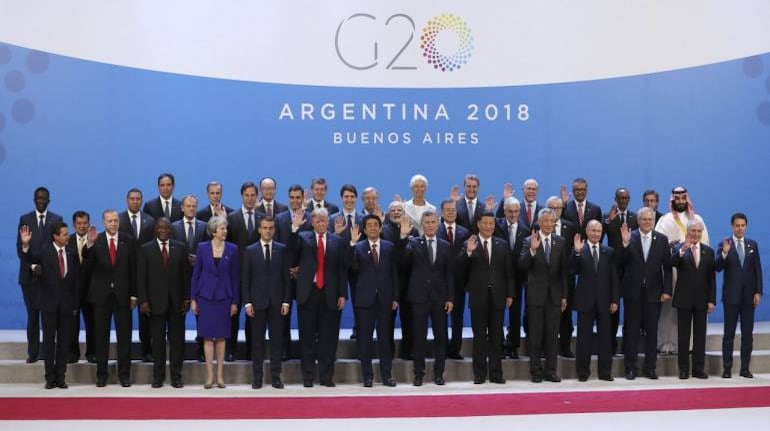
With the commitment of over $5 trillion, the leaders of the 20 largest economies of the world have assured to do whatever it takes to overcome the COVID-19 pandemic. At the extraordinary virtual leaders’ summit called by the Saudi Arabian presidency, the G-20 leaders promised to use all available policy tools to minimise the economic and social damage, restore global growth and maintain market stability. They have also agreed to share all relevant information, expand manufacturing capacity for medical supplies in addition to strengthening the World Health Organization’s (WHO’s) mandate in delivering diagnostic tools, medicines and vaccines.
Immediately after the summit, International Monetary Fund (IMF) Managing Director Kristalina Georgieva declared “it is now clear that we have entered a recession as bad, or worse than in 2009”. It is not just about Europe and the United States; she highlighted that a wide range of problems are building up in emerging markets and developing economies as well. There is drop in commodity prices in addition to $83 billion capital outflows from emerging markets. More than 80 countries have requested the IMF for emergency financing, and emerging markets may need at least $2.5 trillion.
The United States, the hardest hit by the virus, has announced a $2-trillion stimulus package. In Europe, the current epicentre of the epidemic, Germany and France announced their stimulus for €750 billion and €45 billion respectively. To protect businesses and workers, Britain has announced four packages worth 65 billion pounds in tax cuts and spending. The European Central Bank is spending €750 billion in bond purchases to provide more liquidity to member states. The European Union leaders, however, have yet to agree on a common financial response, including the so-called corona bonds — an EU-backed mechanism to raise common debt. As EU is preparing for major economic shocks (reduction in real GDP growth in 2020 by 2.5 percentage points), the organisation has promised to everything at its disposal to minimise the impact.
The Brexit transition period is likely to be extended further. At the moment policy makers on both sides are busy elsewhere. Even Brexit negotiators are down with coronavirus.
“This is a global crisis that requires a global response”, the WHO chief asserted at the summit. Prime Minister Narendra Modi underscored that 90 percent infections and 88 percent deaths were in G-20 countries. As the G-20 constitute more than 80 percent of global GDP, about 75 percent world trade and about two-third population, can it be an appropriate platform to deal with economic consequences of the pandemic?
Although started in 1999 as a meeting of finance ministers and central bank governors, the G-20 is playing much bigger role since 2008, when its leaders first met in Washington in the wake of global financial crisis. Since then, it is transforming itself into addressing broader structural issues including protectionism, climate change etc.
The last few summits have also focussed on developmental issues. From the beginning, New Delhi has been voicing concerns for the larger developing world. In the first summit itself, then Prime Minister Manmohan Singh asserted that emerging markets and developing countries “were not the cause of this crisis, but they are amongst the worst affected victims”.
In recent years, India has been able to bring issues concerning the Doha Development Agenda, quality infrastructure, international labour mobility, global action against terrorist financing and action on fugitive economic offenders to G20 agenda. As a presidency country in 2022, India will also have the opportunity and responsibility to bring the developing world’s aspirations to broader discussions.
It is clear that the 2020 global narrative will be dominated by economic and social consequences due to COVID-19. As the world economy is entering recession, the G-20 will have to play a decisive role in mobilising resources and provide direction to major economies and multilateral institutions.
It is not that the G-20 will replace the work of other institutions; it can look at the larger picture and provide clear policy direction immediately. Its crucial role during the sub-prime and Eurozone crises cannot be underestimated. Now the challenge seems to even bigger. Many members, including China and India, have urged the G-20 to draw up an action plan for policy co-ordination both on health and economic fronts.
Gulshan Sachdeva is Jean Monnet Chair and Chairperson Centre for European Studies, Jawaharlal Nehru University, New Delhi. Views are personal.
Discover the latest business news, Sensex, and Nifty updates. Obtain Personal Finance insights, tax queries, and expert opinions on Moneycontrol or download the Moneycontrol App to stay updated!